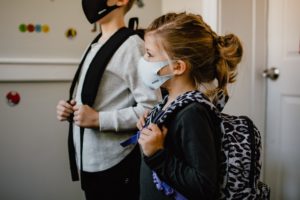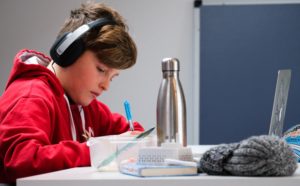
Returning to in-person school after experiencing many changes during the pandemic can be overwhelming and even scary for both you and your child. In these times, it’s important to remember that you and your child are resilient.
During the COVID-19 pandemic, many families experienced loss—including a loss of normalcy, routines, employment, financial resources, loved ones, security, social activities, and more.
For children and teens, these changes disrupted not just their social experiences, but also their education. As caregivers, it’s important to recognize the signs that your child may be struggling with their social, emotional and mental health.
Keep reading for tools from Valera Health’s clinical team of mental health experts to help your child adjust to the new school year and to grow their social, emotional, and learning skills along the way!

Signs that Your Child May Be Struggling with Their Mental Health
Although both children and adolescents may struggle with their mental health, the way this is presented can appear differently in each due to their different developmental ages.
For instance, both children and adolescents might experience an increase in anxiety and/or depression, however younger children may struggle to understand or put words to how they are feeling. Therefore, their more obvious symptoms can be observed through their behaviors. Examples of these behaviors include frequent tantrums, frequent nightmares, disobedience or aggression, hyperactivity, excessive worrying, obsessive ritualistic behaviors, or avoidance of bed or school.
Both children and adolescents may also experience a lower tolerance for stressful situations, poor concentration, changes in their eating or sleeping habits, poor school performance, and increased reports of physical ailments. Additionally, adolescents may develop negative beliefs about the world around them, such as a perceived lack of safety or hopelessness. Adolescents may also engage in increased risk behaviors, as well as experiencing unusual “highs” or “lows” in their mood.
Responding to Your Child’s Mental Health Needs
Being a parent and caregiver is a huge job in its own right, let alone during a pandemic. Any child is at risk for developing mental health concerns, but knowing the warning signs and building a toolbox can help improve their health outcomes.
Here are some tips & tools to help make your job easier…
Remember, you are not alone. Practice talking to your child about their mental health. Active listening and validating your child’s feelings can help create a safe space to explore what’s going on beneath the surface. Let your child know that it’s okay to not be okay. Normalize having a range of emotions and be a role model by talking about your own feelings and experiences in a healthy way.
Don’t be afraid to ask the hard questions while also understanding your child might need time to feel ready and comfortable sharing. Reassure your child they are not at fault for struggling with their mental health. Children may internalize their conditions as a personal fault or fixed part of their personality.
Helping to fight this stigma and reframe how your child views themselves can help promote a positive self-esteem. Celebrate your child’s strengths and promote healthy outlets and social connections. Set clear and consistent routines and expectations. Practice your own self-care and create a self-care plan for your child.

Preparing to Go Back to School
In the whirlwind of the back to school season, many parents and caregivers express feeling overwhelmed with knowing where to get started. For some, this might be your first time sending your child off to school and for others, their children may have experienced disruptions in their learning due to the COVID-19 pandemic.
It’s natural to have questions and concerns about what to expect this school year and how you can support your child with navigating any new changes that might come up. That’s why our clinical team has put together some recommendations and guidelines to help you start this school year off right!.
To prepare your child for their change in routine, it’s helpful to create up a predictable day and night routine for your child before the first day of school. This will allow them to build healthy sleep habits as well as get them into a rhythm that will make the transition to school smoother.
Make a list of any concerns that you or your child might have. Writing these out will provide an opportunity to process these concerns and to brainstorm possible solutions together.
Discuss with your child what the school day will look like. Explain any new or unfamiliar routines and make a plan for transportation to and from school each day. If your child plans to bring themselves to school, consider having them practice their route ahead of time. Gather any needed tools for school in advance such as a backpack, writing utensils, notebooks, etc.. We recommend checking to see if your school has a list available.
If your child has any dietary needs, talk to their school in advance to make a feeding plan and to learn about their options. For young children, start implementing learning into your child’s day to day through fun activities. This will help spark their interest in growth and get them excited about school.
Social Emotional Building
During the pandemic, many children and families experienced social isolation among other hardships. Your child may benefit from opportunities to practice their language vocabulary, communication and social emotional skills. Sesame Street in Communities has some great resources to help your child grow these skills as they prepare to enter new social situations.
Also consider pretend play to help your child process their feelings about school both before and during the school year. Building connections between your child and their community—such as through sports, clubs, and recreation centers—will provide your child with opportunities to foster their talents while also developing healthy social bonds in a structured and supportive setting.

The Impact of COVID-19 on Schools
Your child may experience periods of learning from home due to COVID-19 quarantines, lockdowns or even some snow days.
Although these events are hard to predict, we can do our best to prepare for these possibilities to make these transitions smoother for you and your family and to mitigate disruptions in learning.
Here are some questions to ask your child’s school to better know what to expect:
- Ask about school arrival/departure times and locations.
- How is the school managing social distancing, cleaning, face masks, ventilation, and other hygienic measures?
- How will the school respond to COVID-19 cases and are there policies regarding testing, timelines to return to school, and homework support?
- Learn what the plan will be for recess, lunch time, extracurricular activities and other school facilities such as the library and gym.
- Discuss what support is available to promote students’ mental health and wellbeing.
- If your child is transitioning schools, they may not have had the opportunity to visit ahead of time. Contact the school to see what options are available for touring the school.
- If your child has an IEP or 504 accommodation plan in place, or if you feel your child might benefit from one, discuss with the school how they plan to meet these accommodations and provide any testing if needed.
During the pandemic, many children and families experienced social isolation among other hardships. Your child may benefit from opportunities to practice their language vocabulary, communication and social emotional skills. Sesame Street in Communities has some great resources to help your child grow these skills as they prepare to enter new social situations.

At-home Learning
Whether you and your child are new or experienced with at-home learning, it is important to set up an environment that will be intuitive to your child’s educational needs as well as your household environment. This can be done through staying connected with your child’s school to keep up-to-date with learning assignments, expectations and progress, as well as any learning challenges.
Set up a daily home and learning routine that is predictable and clear. Help your child follow their routines through building their independence and time management skills. Set up a comfortable workspace for your child. Check in regularly with them about their feelings and any concerns they may have. Provide praise and encouragement for their efforts. If you are in need of technology assistance, consider reaching out to other parents, the school, or your local library for support.
Finally, don’t forget to practice your own self-care! Setting personal boundaries is also helpful. Remember to be kind to yourself, especially when faced with a role you may not have anticipated taking on.

Final Thoughts & Additional Resources
Here are additional resources to help you and your child prepare for back-to-school:
- CDC — Helping Young Children and Parents Transition Back to School
- Sesame Street — https://sesamestreetincommunities.org/topics/school-readiness/
- NAMI — 3 Types of School Supports to Help Students With Mental Health Conditions
- NAMI — Mental Health Warning Signs & Symptoms
Here are some helpful resources that you or your child can use:
- NAMI HelpLine — Call #1-800-950-NAMI (6264), text #62640, chat nami.org/help or email at HelpLine@nami.org
- National Suicide Prevention Lifeline — Call 800-273-TALK (8255), available 24/7
- Crisis Text Line — Text NAMI to 741-741
- Connect with a trained crisis counselor to receive free, 24/7 crisis support via text message.
- National Crisis Text Line — Call or text 988 or chat at 988lifeline.org
- Connect with a trained crisis counselor. 988 is confidential, free, and available 24/7.
If you feel your child may need to speak with a professional for ongoing care, your primary care provider and/or insurance plan can be a good place to start for referrals. Valera Health also offers telemental health for children and adolescents, including individual therapy and psychiatry services. Visit www.valerahealth.com or click here to request a consultation.